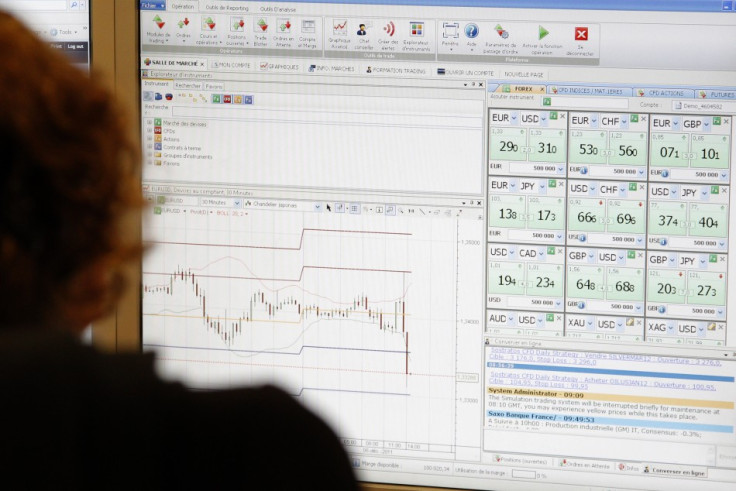European Crisis: Stocks Dip on US Data But Yields Firm on ECB Buying Bet

- Moody's lowers European Union rating outlook to negative from stable
- Swiss economy records surprise 0.1 percent contraction in second quarter
- UK construction sector weakness continues to drag heavily on recovery hopes
- US August manufacturing data falls below 50 for third consecutive month
1545 BST: UK Services PMI
A rather odd situation; Reuters seems to have broken the embargo on publication of the Markit/CIPS Service sector PMI for August, which was due to be published at 0930 BST Wednesday.
The figures show a sharp improvement to 53.7 from 51 in July (well ahead of expectations). The expectations portion is 66.5.
Taking today's manufacturing PMI figure with the Services figure and we get a composite August PMI of 52.2 - up from 49.5 in July and firmly into "plus 50" category.
Quite apart from the embarrassment of early publication, these figures are very market sensitive and should help support weak UK equities after the extended decline following the US manufacturing numbers.
1510 BST: Session lows
FTSE Eurofirst 300 falls to a session low 1,079.94 (down 1.1 percent) after disappointing (to say the least) US manufacturing data. German bund futures have pared losses and are now 7 ticks up on the session at 143.62
1505 BST: Poor US data
ISM's August manufacturing sector PMI slips below 50 (49.6) to the lowest level since July 2009 while the prices paid component spikes to 54 - a *huge* surge from the 39.5 reading in July. Employment and new orders portions of the survey are also at 2009 lows. Grim. I expect European stocks will take a hit on this.
1500 BST: Hollande breaks the silence
France's president Francois Hollande throws his views into the mix with the not unreasonable suggestion that EU leaders need to find "solutions" for Greece and Spain at the October Leaders' summit.
Speaking in Rome at the tail-end of a shuttle-diplomatic visit with Prime Minister Mario Monti, Hollande adds that the ECB needs to be included in the decision making process that must lead to reduced bond yields, and therefore borrowing costs, for the Eurozone members.
1225 BST: Market update
Newsflow's gone quiet in past hour or so, but stocks remain weak: the FTSE Eurofirst 300 is down around 0.7 percent at 1,084.07 while the single currency is hovering around 1.2585 in thin volume. In Britain the FTSE 100 is leading decliners among major European indices with a 1 percent dip (60 points) to 5,698.21.
1050 BST: Food prices
The UN's Food and Agriculture Organisation issued a joint statement this morning with the World Food Programme and the International Fund for Agricultural Development urging "swift action" on global food prices after a 6 percent surge in the FAO's food price index.
The current situation in world food markets, characterized by sharp increases in maize, wheat and soybean prices, has raised fears of a repeat of the 2007-2008 world food crisis. But swift, coordinated international action can stop that from happening. We need to act urgently to make sure that these price shocks do not turn into a catastrophe hurting tens of millions over the coming months.
0950 BST: Sticky inflation
An interesting view from Societe Generale economist Michala Marcussen as to why we're likely to see beyond-taret inflation figures throughout the second half of the year:
Inflation is unlikely toabate as fast as we previously anticipated in mostcountries, despite the global economic slowdown. Threemajor factors are contributing to a temporary rise ininflation. Firstly, oil prices have bounced back over thesummer. Secondly, the recent lift in grain food prices is asource of concern, in particular in many emergingcountries. Lastly, indirect taxes are set to rise in somecountries (euro area, Japan). Inflation has beenquickening but second-round effects are virtually nonexistent,notably because credit growth remainslacklustre. From a monetary policy point of view, the keyconsequence is that the two tail risks, deflation andinflation, are remote over the medium term. This has leftcentral banks with room for manoeuvre to focus onreviving credit growth.
0935 BST: More UK gloom
Britain's double-dip recession is showing few signs of recovery after a key reading of the nation's construction industry fell into contraction. The Markit/CIPS construction PMI figure of 49 (a full point south of the Maginot Line that separates growth from contraction) was well below expectations and the new orders component of the reading had its steepest decline since 2009. The first half pull-back in construction activity was the principal drag on UK growth, according to analysts, and as such the August reading, which comes amid extra attempts to stimulate moribund growth, will make grim reading for Chancellor George Osborne.
"August data reaffirms that UK construction firms are suffering a prolonged downturn in new work and there is little evidence to suggest an imminent rebound in output levels," said Tim Moore, senior economist at survey compiler Markit. "Most worryingly, the latest drop in new orders was the fastest since the sector was in full scale retreat in early 2009."
0930 BST: Stocks weaken
We're around ninety minutes into the trading day and the tone looks set until the US open in a few hours' time: weaker stocks led by macro concerns. The Swiss GDP surprise (a 0.1 percent Q2 contraction after a 0.2 percent downward revision of Q1 to 0.5 percent) has helped clip around 0.6 percent from the domestic benchmark SMI and 0.3 percent from the Europe-wide FTSE Eurofirst 300.
0915 BST: Gilts lower
The "Draghi Effect" is rippling into the UK bond market this morning as Gilt yields rise in contrast to the improving performance of peripheral Eurozone bonds from Spain and Italy. UK Gilt futures are 11 ticks lower at 120.44 while benchmark 10-year yields have risen 5 basis points today to 1.7 percent. The rise will unlikely trouble the UK Debt Management Office's sale of £1.75bn in benchmark 30-year bonds later this morning.
0830 BST: ECB effect
Thursday's interest rate decision from the European Central Bank promises much: analysts are increasingly expecting another cut in the Bank's key lending rate (to 0.5 percent from the current 0.75 percent) and, of course, further and specific detail from President Mario Draghi with respect to the Bank's bond buying programme.
Draghi's July bombshell - in which he told a London audience the Bank would do all it could within its power to protect the single currency - was followed up with sketchy details of ECB purchases at the shorter-end of the yield curve, based on strict conditions (ie the nations whose bonds were being purchased would need to first apply to the EU for formal financial assistance).
Perhaps (finally!) realizing the market turmoil an ECB President can cause when speaking in a public forum, Draghi wisely chose to avoid doing just that at the annual Central Banker geek-out in Jackson Hole, Wyoming, last week, deciding instead to save his ammo for the Thursday press briefing.
Traders are squaring up for big ECB moves in the front-end, however, despite the lack of detail. Benchmark 2-year Italian bond yields are trading 11 basis points lower (pushing the prices higher) at 2.53 percent. Spain's 3-year yields are 9 basis points lower at 4.28 percent.
0810 BST: Spanish data
Further evidence this morning of the near-impossible task Spain faces in its efforts to right the listing economy and deliver deficit targets that even approach those demanded by EU creditors. The country's Labor Ministry reported an August increase in unemployment of 0.83 percent - a figure that adds an extra 38,179 to the more than 4.6m Spanish jobless.
We've also learned from European Central Bank data that depositors pulled more than €74bn from Spain's banks in the month of July - more than double the previous monthly record - taking the full-year capital flight figures to around 11 percent of total bank deposits.
0805 BST: Early fall
Stocks look a bit heavy at the open as the FTSE 100 drifts around 0.1 percent, or 6 points, lower to 5752 in the first few minutes of trading. The broader FTSE Eurofirst 300 is also down 0.1 percent to 1,090.67 and we're seeing slightly steeper declines - but not by much - in Spain and Italy.
0750 BST: Good Morning
Lots of overnight news to sift through as we gear back into the full crank of European market activity after the August lull.
Asian markets fell across the board last night after the latest move by Moody's Investors Service to lowered the outlook on the European Union's triple-A credit rating to negative from stable as the ratings company cited increased economic risks in the core - notably France and Germany - and also in the United Kingdom. Moody's also suggested there was a "weakening of the commitment of the member states" to the broader EU project, a topic addressed in a speech by German Chancellor Angela Merkel yesterday during a rally in Bavaria in which she urged "solidarity" with Germany's European partners.
The broadest measure of stocks around the region, the MSCI Asia Pacific Index, fell as much as 0.4 percent during the mid-portion of the session before ending the day little-changed at 117.72.
European shares are called to open little-changed, as well, by the financial bookmakers, ahead of a trading day that's light on major macro-economic data.
In other news, Switzerland's economy fell by 0.1 percent in the second quarter, a surprise contraction that followed a downward revision of first quarter growth to 0.5 percent from 0.7 percent. Switzerland's exports have been hit hard by the rising value of the franc, which is increasingly seen as a safe-haven for investors as they exit the European single currency.
© Copyright IBTimes 2024. All rights reserved.






















